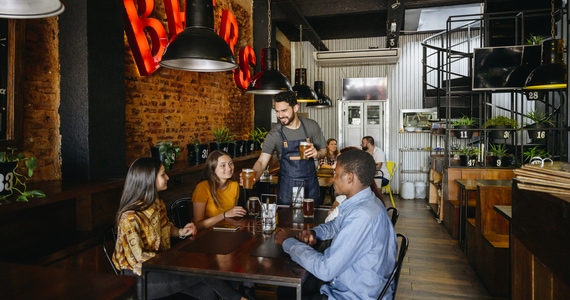A chef-approved list of Best Restaurants across the continent
A chef-approved list of Best Restaurants across the continent
Blog Article
Dining Thrills: Check Out Cutting-edge Restaurants Changing the Food Scene
The contemporary dining landscape is experiencing an exceptional improvement, noted by ingenious dining establishments that are redefining cooking norms. From the surge of pop-up establishments accepting seasonal active ingredients to immersive experiences that involve the detects in extraordinary means, these venues are setting brand-new standards of what it indicates to delight in a dish. Additionally, a growing emphasis on sustainability and neighborhood sourcing reflects a dedication to both quality and community. As we discover these fads, the inquiry arises: what future developments might even more improve our cooking experiences?
The Surge of Pop-Up Restaurants
As the cooking landscape advances, pop-up restaurants have arised as a dynamic force, charming food fanatics and business owners alike. These short-term eating establishments, commonly set up in unique rooms, use a distinct blend of creativity and access, attracting a varied series of customers. The increase of pop-up dining establishments can be credited to several elements, including the growing need for novel eating experiences and the entrepreneurial spirit of cooks keen to examine their culinary concepts without the monetary problem of a long-term location.Pop-up dining establishments allow cooks to try out menus, designs, and motifs, often concentrating on seasonal or locally-sourced active ingredients. This adaptability not only cultivates innovation but also develops a sense of necessity, as patrons are attracted to the limited-time offerings. The ephemeral nature of pop-ups cultivates a buzz around the eating experience, encouraging social networks sharing and word-of-mouth promo, which can substantially enhance exposure and bring in a dedicated following.Furthermore, pop-up dining establishments frequently deal with specific niche markets, varying from vegan and gluten-free options to ethnic foods, thereby satisfying the varied dietary preferences of modern consumers. Consequently, these establishments contribute to the rich tapestry of the food scene, pushing borders and tough standard ideas of dining.
Immersive Dining Experiences

Sustainable Practices in Food
Welcoming sustainability, ingenious dining establishments are redefining their culinary practices to reduce environmental impact while improving the eating experience. These establishments focus on neighborhood sourcing, typically collaborating with neighboring farmers and manufacturers to ensure that active ingredients are fresh and seasonal. This not just reduces the carbon footprint related to long-distance transport but also sustains local economies.In addition to sourcing, dining establishments are significantly adopting methods that decrease waste. Many are implementing composting systems and using food scraps artistically, changing what would typically be discarded into savory components of brand-new dishes. Vegetable trimmings can locate brand-new life in supplies or garnishes, while stale bread is repurposed into croutons or bread puddings.Moreover, the trend in the direction of plant-based food selections is getting momentum. By highlighting veggies, grains, and legumes, restaurants can substantially reduce their ecological impact, as plant-based foods generally call for less resources and generate much less greenhouse gas exhausts contrasted to meat manufacturing. Cutting-edge chefs are crafting recipes that not just commemorate these active ingredients yet additionally supply restaurants with a remarkable cooking experience.Furthermore, many facilities are embracing green methods such as using eco-friendly product packaging for takeout and investing in energy-efficient appliances. These steps reflect a commitment to sustainability at every level of operation, enabling restaurants to appreciate their dishes with the understanding that their options add to a healthier planet. As the food scene remains to develop, the combination of sustainable techniques ends up being not just a pattern, however an essential criterion for the future of dining
Tech-Enhanced Eating Experiences
Tech-enhanced eating journeys are changing the means patrons experience dishes, with over 70% of dining establishments now including digital innovations to boost service and involvement. These improvements are not just fads; they are essential shifts that redefine the culinary landscape. From the minute restaurants enter a dining establishment, innovation is perfectly woven into the experience, improving both benefit and enjoyment.One of the most remarkable innovations is the use of mobile applications for reservations and food selection surfing. Diners can now see in-depth descriptions, dietary details, and even the beginnings of components at their fingertips. This transparency cultivates educated options and permits guests to tailor their eating experience to their preferences.Furthermore, interactive tables geared up with touchscreens provide an appealing platform for purchasing and enjoyment. Restaurants can customize their meals, check out red wine pairings, or perhaps play video games while waiting for their dishes. This combination of modern technology not only simplifies the getting procedure yet also turns dining right into a dynamic, public activity.Moreover, some facilities are using increased fact (AR) to produce immersive dining experiences. By merely pointing a smartphone at a recipe, customers can visualize the components and cooking methods in an interesting manner, linking the space in between the cooking and electronic worlds.As restaurants proceed to welcome these technical technologies, the eating experience comes to be increasingly customized, efficient, and satisfying. This makeover shows a more comprehensive trend in the direction of improving consumer interaction, making certain that each meal is not practically food, however a memorable journey in eating.
Worldwide Flavors With a Twist
The culinary landscape is significantly noted by blend food innovations that mix conventional tastes with unanticipated components - Restaurants. Unique ingredient pairings not only boost the dining experience yet likewise pay homage to cultural heritage, reimagining beloved meals in exciting brand-new methods (Eddie's Rise N' Dine Williamsville IL). This creative approach welcomes diners to discover diverse worldwide influences while experiencing familiar tastes in a fresh context
Fusion Cuisine Innovations
Creativity in the cookeries has caused a vibrant resurgence of combination food, where cooks blend varied international tastes to create cutting-edge recipes that oppose conventional borders. This culinary activity goes beyond simple combination, concentrating on the harmonious integration of ingredients and strategies from numerous cultures.Restaurants focusing on blend cuisine are redefining eating experiences by providing recipes that narrate with taste, technique, and presentation. The marriage of Japanese sushi with Peruvian ceviche has actually resulted in distinct rolls that commemorate both cooking heritages. Similarly, Indian flavors have found their means into Italian pasta recipes, using a delightful spin on timeless recipes.Chefs are also exploring with cooking methods, such as utilizing standard frying pan strategies to prepare Latin American stir-fries, consequently producing an abundant tapestry of preferences and textures. Seasonal schedule of active ingredients better improves this creative procedure, enabling fresh interpretations of time-honored dishes. The attraction of combination food depends on its ability to shock and pleasure the taste, encouraging restaurants to check out new culinary landscapes while promoting a better appreciation for the diversity of worldwide gastronomy.
One-of-a-kind Active Ingredient Pairings
Culinary advancement often flourishes on the unexpected, and special active ingredient pairings are at the forefront of this pattern in the modern eating landscape. Cooks are significantly trying out with mixes that shock and delight the taste buds, boosting the dining experience beyond standard boundaries.For instance, the juxtaposition of pleasant and savory has become a characteristic of modern cuisine. American Restaurant. Think of crispy duck offered with a cherry and balsamic glaze, where the flavor of the cherries matches the richness of the meat. Dishes including miso-infused delicious chocolate desserts showcase exactly how umami can boost sweetness, creating a well balanced taste account that intrigues diners.Furthermore, the use of unusual spices in unexpected contexts, such as saffron in a traditional risotto paired with lemon passion, highlights exactly how cooking boundaries can be redefined. These innovative pairings not only produce visual and textural contrasts but likewise invite restaurants to check out a range of international tastes in a single dish.As dining establishments proceed to press the envelope, the excitement of discovering new preferences with special active ingredient pairings promises to be a specifying attribute of the modern-day food scene, welcoming daring eaters to enjoy these innovative cooking discussions
Cultural Heritage Reimagined

The Art of Multi-Sensory Meals
In the domain name of cooking innovation, multi-sensory meals are changing the dining experience by intertwining flavor and aroma in enchanting means. The effect of visual discussion enhances not simply the aesthetic charm yet also the assumption of preference, while very carefully curated soundscapes boost the atmosphere. With each other, these components create an alternative experience that engages all senses, transforming just how clients get in touch with food.
Taste and Aroma Blend
A growing variety of chefs are embracing the concept of taste and aroma fusion, recognizing that a dish is not just a mix of ingredients yet a holistic experience that involves all the senses. This ingenious approach highlights the complex connection in between taste and scent, both of which significantly influence our perception of food.Chefs are trying out different strategies to improve tastes while at the same time crafting aromatic accounts that raise the dining experience. As an example, using aromatic herbs and spices not only includes deepness to recipes yet likewise entices the olfactory senses, producing a much more immersive experience. Infusions, smoke, and important oils are significantly prominent, enabling cooks to control aroma and enhance the overall flavor profile.Moreover, the critical pairing of corresponding and different tastes can stimulate emotional actions, changing a meal right into a remarkable occasion. Restaurants are urged to enjoy each bite, as the interaction of tastes and scents unravels, inviting them to check out new measurements of preference. This thoughtful amalgamation of sensory components promotes an appreciation for the artistry of cuisine, placing flavor and fragrance combination as a pivotal pattern in modern gastronomy.
Aesthetic Discussion Influence
Beyond flavor and aroma, the visual presentation of a dish plays an important role in the overall eating experience. The aesthetic appeals of food can evoke emotions, set the tone for the dish, and boost the expectancy of sampling. Cutting-edge restaurants are increasingly recognizing that a meal's appearance can influence visitors' assumptions and complete satisfaction levels, in some cases even before the first bite is taken.Artful plating methods, lively shade combinations, and innovative garnishes add to a dish's visual appeal. Cooks are currently educated not just in cooking abilities, however also in the art of presentation, commonly drawing inspiration from numerous artistic techniques. The use of adverse space in plating assists to produce focal factors, permitting the components to shine.Moreover, the trend of multi-sensory meals incorporates aesthetic components with other detects, such as structure and temperature, to produce an alternative dining experience. This method encourages restaurants to engage more deeply with their food, transforming a straightforward meal into a remarkable event. Basically, the aesthetic discussion of food is not simply an aesthetic venture; it is a vital component of the dining experience that can boost a meal from common to extraordinary.
Soundscapes in Dining
The experience of dining extends beyond the visual elements of a dish; sound additionally plays a substantial role fit exactly how food is regarded and enjoyed. Cutting-edge restaurants are significantly checking out the concept of soundscapes-- curated audio atmospheres created to boost the eating experience (Eddie's Rise N' Dine Williamsville IL). The interaction of sound and preference can greatly affect an individual's assumption of taste, texture, and general satisfaction.Research indicates that particular noises can intensify or reduce tastes. As an example, piercing audios may enhance sweetness, while reduced regularities can heighten bitterness. This phenomenon has led some cooks and restaurateurs to work together with audio developers, developing distinct auditory backdrops that complement their culinary offerings. Restaurants.In these setups, diners might find themselves engaged in a very carefully crafted audio atmosphere, varying from the gentle rustle of fallen leaves to the balanced noises of a bustling kitchen area. Such multisensory dishes not only involve the taste buds however likewise evoke psychological reactions, boosting the total experience. By utilizing the power of noise, these innovative eating facilities are redefining the way we experience food, encouraging customers to appreciate each bite while totally involving their detects
Community-Centric Culinary Initiatives
Regularly, cutting-edge dining establishments are redefining their duties within neighborhood areas by implementing culinary campaigns that focus on social responsibility and inclusivity. These establishments are increasingly interesting in techniques that not just boost their company models but likewise add to the well-being of their neighborhoods.One famous trend is the facility of community kitchens that use cooking training and work positioning for underserved populations. These cooking areas not just give important skills but likewise promote a sense of belonging, equipping individuals to create their own cooking courses. Additionally, lots of restaurants are partnering with neighborhood farms and manufacturers, emphasizing farm-to-table methods that sustain sustainable farming and reduce carbon impacts. This not just guarantees quality and top quality yet also strengthens neighborhood economies.Another effort obtaining grip is the idea of common eating experiences, where diverse groups collaborated to share dishes and tales. This method grows understanding and appreciation among various societies, damaging down barriers and cultivating inclusivity. Dining establishments are increasingly embracing waste reduction techniques, such as composting and reusing food scraps, which not only addresses environmental problems but likewise urges patrons to reflect on their intake behaviors.
Regularly Asked Questions
How Do Innovative Dining Establishments Preserve Uniformity in Food Quality?

What Are the Prices Linked With Beginning a Pop-Up Dining Establishment?
Starting a pop-up restaurant involves various costs, including place service, tools acquisitions, permits, advertising and marketing, staffing, and food materials. Additionally, entrepreneurs should allocate unanticipated expenditures to ensure smooth procedures throughout the endeavor's duration.
Just How Do Restaurants Pick Their Locations for Pop-Up Occasions?
Dining establishments select pop-up occasion Breakfast Served Near Me places based upon target demographics, foot traffic, accessibility, and competitors. Furthermore, they think about regional market fads and community involvement chances to take full advantage of visibility and enhance consumer experience during the occasion.
What Impact Do Food Trends Have on Restaurant Menus?
Food fads significantly influence restaurant menus by directing component option, affecting recipe creative thinking, and shaping consumer choices. Establishments commonly adapt to these fads to enhance client allure, preserve competition, and straighten with progressing culinary assumptions.
How Can Diners Support Community-Centric Culinary Initiatives?
Diners can support community-centric culinary campaigns by patronizing regional dining establishments, taking part in farm-to-table events, engaging with food cooperatives, advertising lasting methods, and supporting for policies that reinforce neighborhood food systems and boost community health.
Report this page